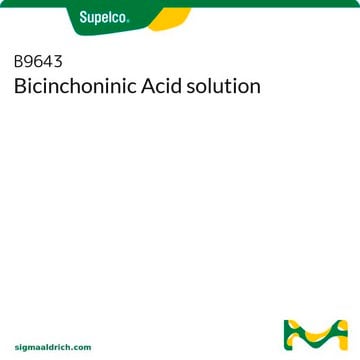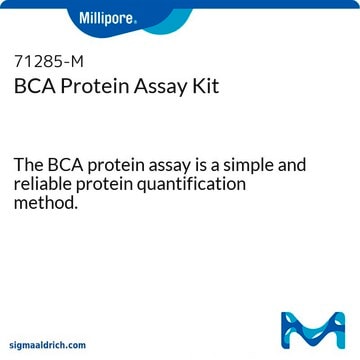C2284
Copper(II) sulfate solution
4 % (w/v) (prepared from copper (II) sulfate pentahydrate)
Sinónimos:
Cupric sulfate standard
About This Item
Productos recomendados
form
liquid
Quality Level
reaction suitability
reagent type: catalyst
core: copper
concentration
4 % (w/v) (prepared from copper (II) sulfate pentahydrate)
pH
4
suitability
suitable for determination of total protein (Recommended use with BCA solution (B9643) for total protein determination.)
storage temp.
room temp
SMILES string
[Cu++].[O-]S([O-])(=O)=O
InChI
1S/Cu.H2O4S/c;1-5(2,3)4/h;(H2,1,2,3,4)/q+2;/p-2
InChI key
ARUVKPQLZAKDPS-UHFFFAOYSA-L
¿Está buscando productos similares? Visita Guía de comparación de productos
Application
- Structural Simulation and Performance Evaluation of a Novel Synthesized ZIF in the Adsorption of MO from Aqueous Solutions: This paper evaluates a newly synthesized zeolitic imidazolate framework (ZIF), incorporating copper(II) sulfate for enhanced adsorption of methyl orange from water, demonstrating its efficacy in water purification technologies (Ravankhah and Fathi, 2024).
Packaging
Suitability
signalword
Danger
hcodes
Hazard Classifications
Aquatic Acute 1 - Aquatic Chronic 1 - Eye Dam. 1
Storage Class
12 - Non Combustible Liquids
wgk_germany
WGK 3
flash_point_f
Not applicable
flash_point_c
Not applicable
Certificados de análisis (COA)
Busque Certificados de análisis (COA) introduciendo el número de lote del producto. Los números de lote se encuentran en la etiqueta del producto después de las palabras «Lot» o «Batch»
¿Ya tiene este producto?
Encuentre la documentación para los productos que ha comprado recientemente en la Biblioteca de documentos.
Los clientes también vieron
Protocolos
To determine protein content, the Warburg-Christian method refers to measuring protein samples at 280 nm using a spectrophotometer.
To determine protein content, the Warburg-Christian method refers to measuring protein samples at 280 nm using a spectrophotometer.
To determine protein content, the Warburg-Christian method refers to measuring protein samples at 280 nm using a spectrophotometer.
Contenido relacionado
Métodos de cuantificación de proteínas, reactivos y tecnología de inmunoanálisis para la medición precisa de las concentraciones de proteínas en una variedad de muestras.
Protein quantification methods, reagents, and immunoassay technology for accurately measuring the protein concentrations in a variety of samples.
Métodos de cuantificación de proteínas, reactivos y tecnología de inmunoanálisis para la medición precisa de las concentraciones de proteínas en una variedad de muestras.
Métodos de cuantificación de proteínas, reactivos y tecnología de inmunoanálisis para la medición precisa de las concentraciones de proteínas en una variedad de muestras.
Nuestro equipo de científicos tiene experiencia en todas las áreas de investigación: Ciencias de la vida, Ciencia de los materiales, Síntesis química, Cromatografía, Analítica y muchas otras.
Póngase en contacto con el Servicio técnico











